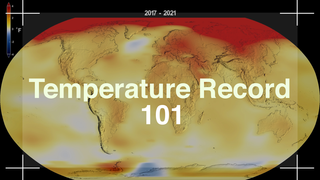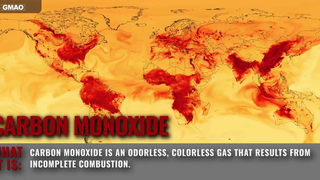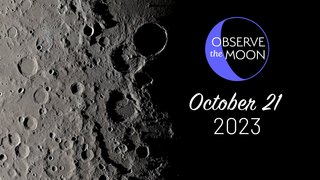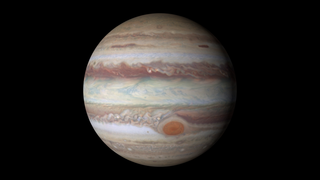Earth
ID: 14268
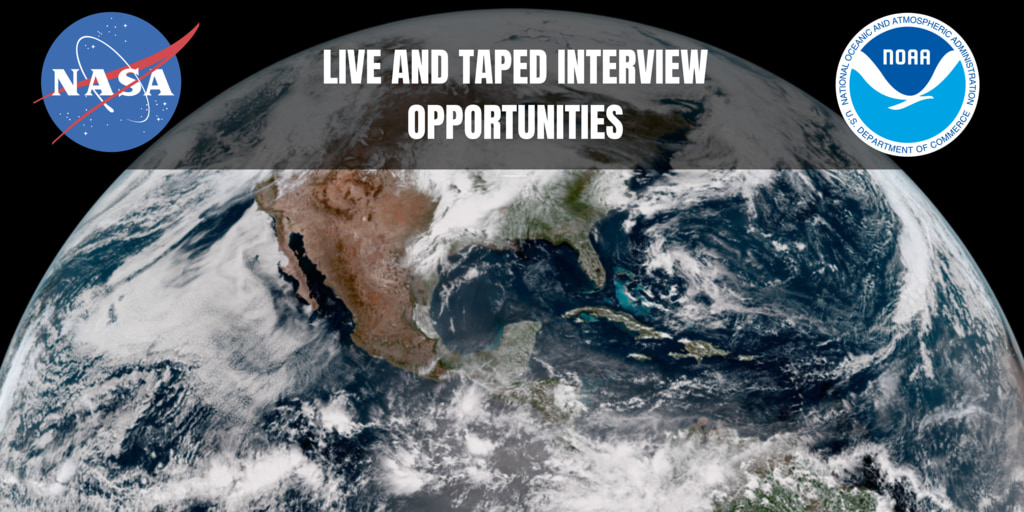
Global Temperature, Greenhouse Gasses, and Where 2022 Ranks in the Climate Record
Each year, NASA and NOAA undertake the huge task of measuring the average temperature of the Earth, using many thousands of measurements all around the globe. 2022 was no different, and we even launched some new missions to help continue observing the Earth. In 2022 we spotted greenhouse gas emissions from the International Space Station, tracked powerful hurricanes and wildfires, and monitored impacts from a highly unusual third consecutive La Niña. Understanding long-term changes in our environment is vital to how we approach climate solutions, from planting different crops to managing water resources, and everything in between.
On January 12th, climate experts from NASA and NOAA will release their annual assessment of global temperatures over the last year. Find out where 2022 fell in the climate record books, and what it means for the longer term trend.
For more information or to tune into the media teleconference at 11 a.m. EST on Thursday, January 12 please visit: https://www.nasa.gov/
Live interviews are available
Thursday, January 12 from 3 p.m. - 7 p.m. EST
Friday, January 13 from 7 a.m. - 12 p.m. EST
**Click here to request an interview: https://forms.gle/qzLAizhtAqc93voYA
Requests sent via the above form will have scheduling priority.
Please do not email requests.
Anchor Intro:
For decades, NASA and NOAA have been keeping careful watch on Earth’s changing climate. Each year they release an update to the hottest years on record, yesterday they added 2022 to the books. NASA and NOAA keep an eye on things like greenhouse gasses and track potential climate solutions. Here to talk about that work and where 2022 lands in the records is NASA/NOAA expert XX.
Suggested Questions:
NASA and NOAA have just released the global temperature data for 2022. Where does it rank for hottest years on record?
2022 is part of a much larger climate record, how do the changes you're observing impact people and society?
NASA and NOAA launched new satellites to help study Earth this year. How do NOAA and NASA satellites help us understand our climate and weather?
What do we expect to see in the future?
Where can we learn more?
Do you have feedback for the Live Shot Program or want to be removed from our contact list? We would love to hear from you HERE!
NASA and NOAA Interview Opportunity: The numbers are in! See Where 2022 Ranks for Hottest Year on Record

Each year, NASA and NOAA undertake the huge task of measuring the average temperature of the Earth, using many thousands of measurements all around the globe. 2022 was no different, and we even launched some new missions to help continue observing the Earth. In 2022 we spotted greenhouse gas emissions from the International Space Station, tracked powerful hurricanes and wildfires, and monitored impacts from a highly unusual third consecutive La Niña. Understanding long-term changes in our environment is vital to how we approach climate solutions, from planting different crops to managing water resources, and everything in between.
On January 12th, climate experts from NASA and NOAA will release their annual assessment of global temperatures over the last year. Find out where 2022 fell in the climate record books, and what it means for the longer term trend.
For more information or to tune into the media teleconference at 11 a.m. EST on Thursday, January 12 please visit: https://www.nasa.gov/
Live interviews are available
Thursday, January 12 from 3 p.m. - 7 p.m. EST
Friday, January 13 from 7 a.m. - 12 p.m. EST
**Click here to request an interview: https://forms.gle/qzLAizhtAqc93voYA
Requests sent via the above form will have scheduling priority.
Please do not email requests.
Anchor Intro:
For decades, NASA and NOAA have been keeping careful watch on Earth’s changing climate. Each year they release an update to the hottest years on record, yesterday they added 2022 to the books. NASA and NOAA keep an eye on things like greenhouse gasses and track potential climate solutions. Here to talk about that work and where 2022 lands in the records is NASA/NOAA expert XX.
Suggested Questions:
NASA and NOAA have just released the global temperature data for 2022. Where does it rank for hottest years on record?
2022 is part of a much larger climate record, how do the changes you're observing impact people and society?
NASA and NOAA launched new satellites to help study Earth this year. How do NOAA and NASA satellites help us understand our climate and weather?
What do we expect to see in the future?
Where can we learn more?
Do you have feedback for the Live Shot Program or want to be removed from our contact list? We would love to hear from you HERE!
Related
For More Information
https://earthobservatory.nasa.gov/images/150797/weather-whiplash
https://earthobservatory.nasa.gov/images/150804/atmospheric-river-lashes-california
Credits
Michelle Handleman (KBR Wyle Services, LLC): Lead Producer
Aaron E. Lepsch (ADNET Systems, Inc.): Technical Support
Christina Brooke Mitchell (KBR Wyle Services, LLC): Lead Producer
Pedro Cota (ADNET Systems, Inc.): Lead Producer
María José Viñas (Telophase): Lead Producer
Noelia Gonzalez Moreira (ADNET Systems): Lead Producer
Katie Jepson (KBR Wyle Services, LLC): Editor
Aaron E. Lepsch (ADNET Systems, Inc.): Technical Support
Christina Brooke Mitchell (KBR Wyle Services, LLC): Lead Producer
Pedro Cota (ADNET Systems, Inc.): Lead Producer
María José Viñas (Telophase): Lead Producer
Noelia Gonzalez Moreira (ADNET Systems): Lead Producer
Katie Jepson (KBR Wyle Services, LLC): Editor
Please give credit for this item to:
NASA's Goddard Space Flight Center
NASA's Goddard Space Flight Center
Short URL to share this page:
https://svs.gsfc.nasa.gov/14268
Keywords:
SVS >> Global Temperature
NASA Science >> Earth
https://svs.gsfc.nasa.gov/14268
Keywords:
SVS >> Global Temperature
NASA Science >> Earth
